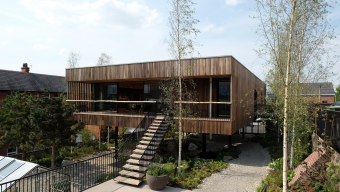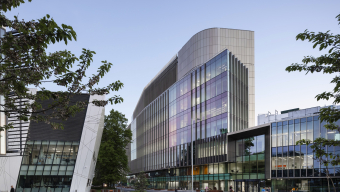This Study tour will take place on Wednesday 28 February, between 09.00–15.00, and will visit the Christie Paterson Cancer Research Centre in Manchester and Maggie’s Oldham. Learn more about the projects in the Programme.
If you are interested in participating on the tours, please e-mail info@europeanhealthcaredesign.eu. Bookings will be subject to a fee of £45 + VAT and availability of places, with preference given to NHS trusts in the event of tours being oversubscribed.
Maggie’s Oldham

Designed by Alex de Rijke of dRMM, Maggie’s Oldham opened in 2017 in the grounds of the Royal Oldham Hospital. It’s believed to be the world’s first engineered hardwood building, set across one storey and supported over its garden by steel legs. The interior is designed around a circular window, through which a tree rises up from the garden below. The exterior is clad in corrugated, thermally treated tulipwood, which has also been worked into cross-laminated timber to create the main load-bearing structure. Door fixings are made from timber, too – a small touch that makes a big difference. This decision was informed by the peripheral neuropathy experienced by some cancer patients, which can make people extra sensitive to hot and cold surfaces, such as metal. The kitchen also features an enormous plank of walnut as a work surface. The internal space can be subdivided by a series of curtains, while the tree growing through the centre brings nature inside. The garden, designed by Rupert Muldoon, flows below the building into a walled and secluded woodland sanctuary. It takes inspiration from the surrounding Pennines to plant a textured, ephemeral wilderness, which is also ornamental and composed of highly scented flowers and shrubs. The greenhouse and potted herb garden offer a more social place, with the opportunity of some hands-on gardening for centre visitors.
Christie Paterson Cancer Research Centre in Manchester

Designed by BDP for the Christie NHS Foundation Trust, the University of Manchester, and Cancer Research UK, the £150m Christie Paterson Cancer Research Centre includes laboratories, research spaces, and consultant workspace. At more than 25,000 sq m and ten storeys high, the new building is more than twice the size of the previous facility, which was severely damaged in a fire. It promises to transform organisational adjacencies through co-location of research groups and clinicians. It will be Manchester’s scientific headquarters for discovery science, as part of the International Alliance for Early Cancer Detection, housing more than 300 scientists, 400 clinicians, and operational staff. They will deliver clinical trials covering the full extent of the patient pathway, from prevention and novel treatments to living with and beyond cancer. With a focus on early detection and diagnosis of cancer, the new Cancer Research UK Biomarker Centre will also form a central component of the building.

